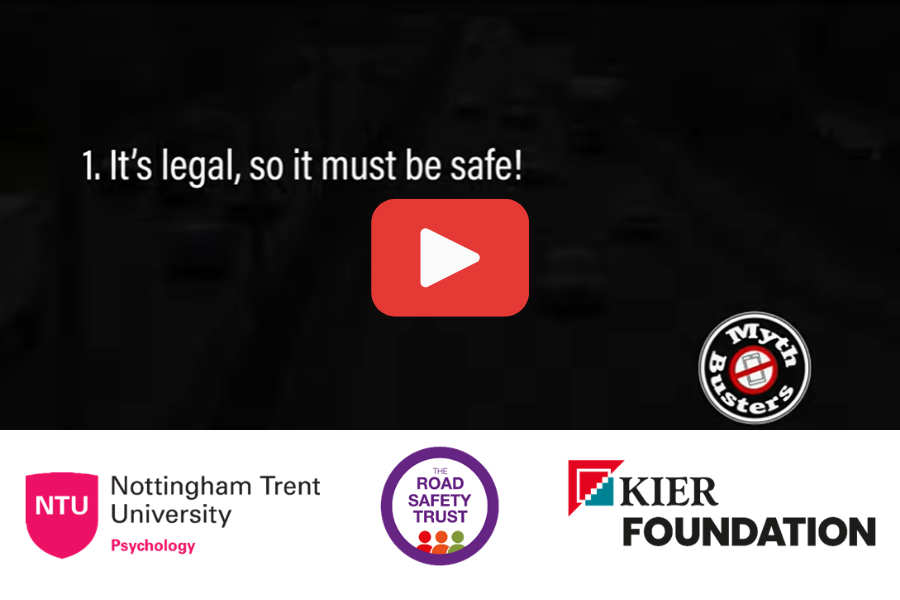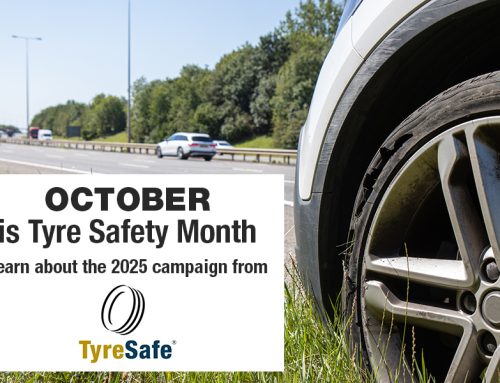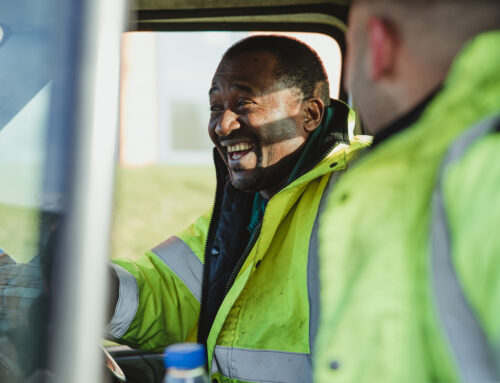How safe are you on a hands-free call?
Persuading professional drivers that hands-free phones are as dangerous as handheld phone calls
Using a handheld mobile phone while driving in the UK is illegal – even if you’re at red traffic lights or at a standstill. Most people know this – and are aware of the fines and penalty points should they choose to break the law. That’s why we have hands-free phones, right?
Using these is a safer alternative. Or is it?
Increasingly more and more companies are banning their drivers from making or taking hands-free calls in their vehicles while driving for work. Do these companies know something the rest of us don’t?
In a project funded by a Road Safety Trust grant awarded to The Kier Foundation, the project team focused on creating a resource to discourage the use of mobile phones while driving – specifically looking at professional drivers, and those who drive for work. The resource was developed and produced as a collaboration between the Kier Group, Kier Foundation and Nottingham Trent University.
The project aimed to uncover attitudes towards hands-free phone use, looking at driver behaviour – and the reasoning for breaching zero tolerance hands-free driving policies by some commercial drivers.
The findings were used to produce a “myth-busting” video to challenge these attitudes. The video is now available to help reduce distraction-based collisions involving fleet drivers across the UK.
What do drivers think about hands free calls?
They asked 500 professional van drivers about hands free phones calls. Many recognised the dangers of using a mobile phone while driving – but thought it perfectly safe to use hands-free calls.
The top reason given for this was, “It’s legal – so it must be safe.”
Does legal mean the same as safe though? Traffic Psychologist, Dr Andrew McKenzie says not:
“We know hands-free calls are dangerous – but we don’t have the technology to detect these calls in real time. However, the police will check if you were on a call if you are involved in a collision – and even if you were on a hands-free call, you can be charged with driving without due care and attention – or worse”.
Driving is wasted time – why not take calls?
There is a belief among some drivers that the wasted time while driving could be more productive using hands-free calls to join meetings. This is based on the (incorrect) belief that driving is easy.
To demonstrate how much processing power it requires for our brains while we are driving, the video shows how eye tracking glasses prove that we only sample one small area of what is in front of us at any one time (fixations).
Our sight is good in this one spot – everything around that spot is a little more blurry. We are able to build up one image from these smaller images – but this process can be easily disrupted.
An example is when we give directions over the phone when we are driving – by using the visual part of the brain, we will find it harder to keep the vehicle in the lane. You’ll often find yourself looking up to the left or right as you visualise the route you are describing.
A glance away from the road for just 2 seconds can increase the risk of a collision by 24 times. If you’re scrolling on a screen, you’ll be looking away for a lot longer than 2 seconds, and so the risk increases.
A hands-free call is as dangerous as a handheld call because your mind is not on the road. Watch the video to understand exactly what is going on in our heads when we take a call while driving.
Do you cover mobile use in your Driving Policies?
There some interesting key learnings in the final report, which is available to be downloaded here from the Road Safety Trust website. Many of the findings will be of interest to driver managers and safety managers in relation to safety policies for those who drive for work.
A Driving for Work Policy should include a section on journey Management – and this will include your company’s policy on mobile phone usage. The template policy available from Driving for Better Business offers two options on wording, depending on the company’s position.
Kier Group have a policy banning all mobile use including hands-free calls.
Ray Webb, group senior insurance claims manager, Kier Group, said: “The safety of our people is our most important duty – whether this is on site or while travelling – and Kier has had a policy in place on hands-free phones for a number of years.
“This work with the Road Safety Trust and Nottingham Trent University will help to educate and protect everyone on the roads about the dangers of hands-free calls.”
The safety of your drivers – and other road users.
Professor David Crundall, Nottingham Trent University, who worked on the project said:
“We’ve known about the dangers of hands-free phones for decades, but the message has just not got through.
“Now, through our work with Kier, we have demonstrated that it is possible to present the evidence in such a way as to change drivers’ attitudes to hands-free use.
“Our next challenge is to make sure as many drivers as possible are exposed to this message.”
Ruth Purdie OBE, chief executive of The Road Safety Trust, said: “Despite its legality, it is well understood that the use of hands-free mobile phones is a danger to drivers.
“As a result, this resource can play a key role in helping organisations to keep their drivers safe on the roads, such is their responsibility. We encourage them to make use of it.”
The video is available for fleet managers and driver managers to share here.








